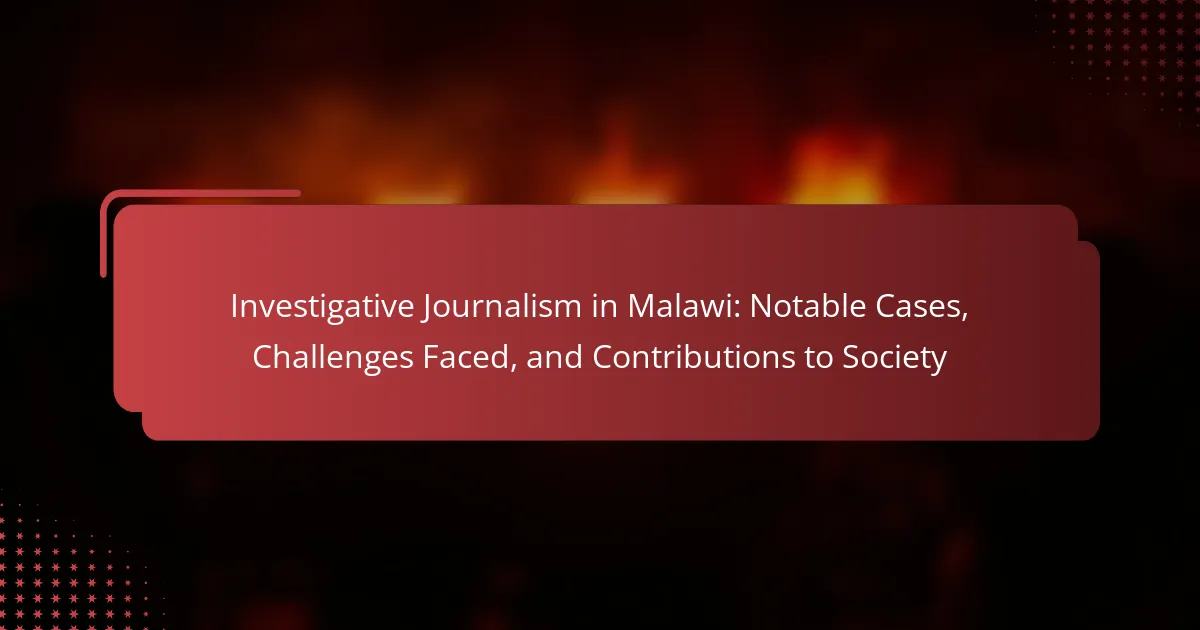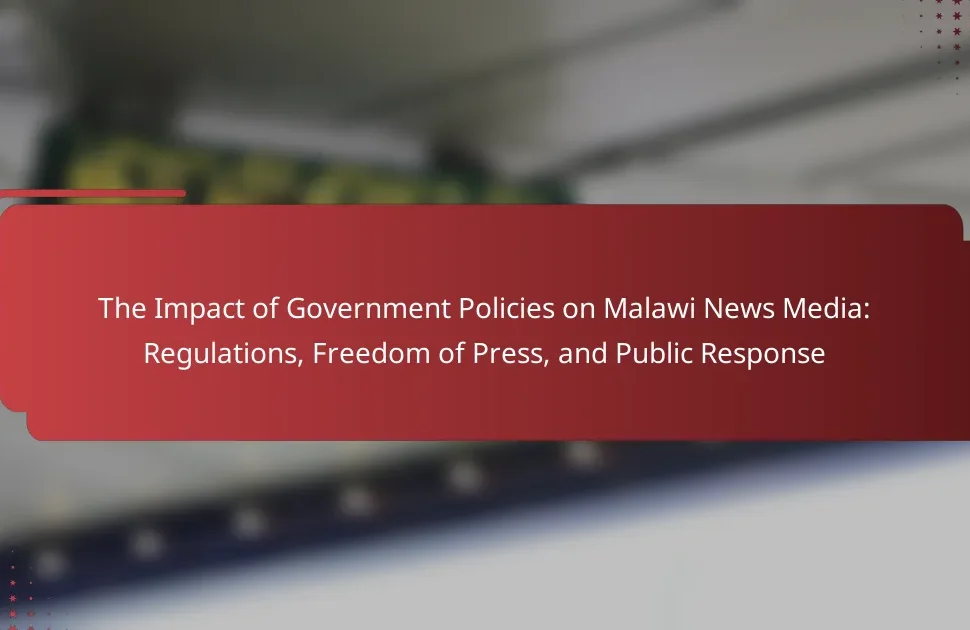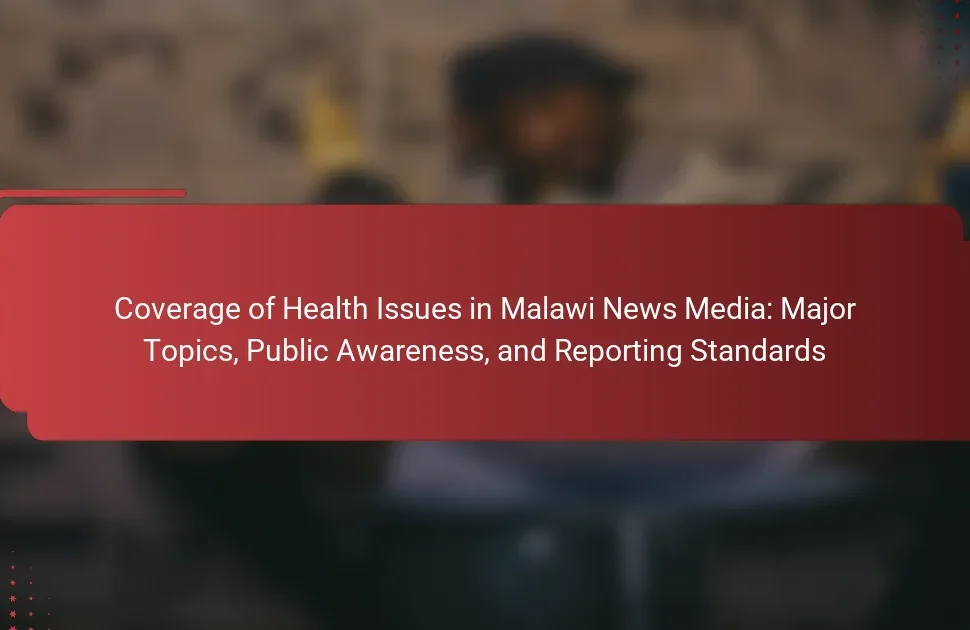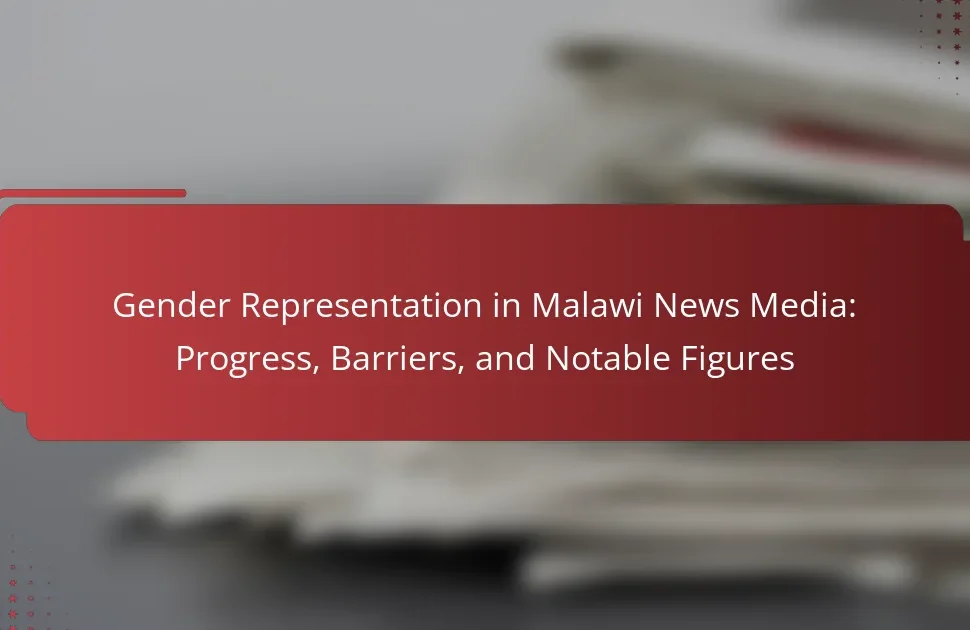Investigative journalism in Malawi serves to uncover hidden truths and expose corruption within government and institutions, fostering transparency and accountability in society. This article examines notable cases, such as the 2011 cashgate scandal and the 2018 Ministry of Health funding misuse, which have led to significant political and social changes. It highlights the challenges faced by journalists in this field and emphasizes their role in informing the public about critical issues. Through in-depth research and reporting, investigative journalism empowers citizens to demand accountability from their leaders and strengthens democratic processes in Malawi.
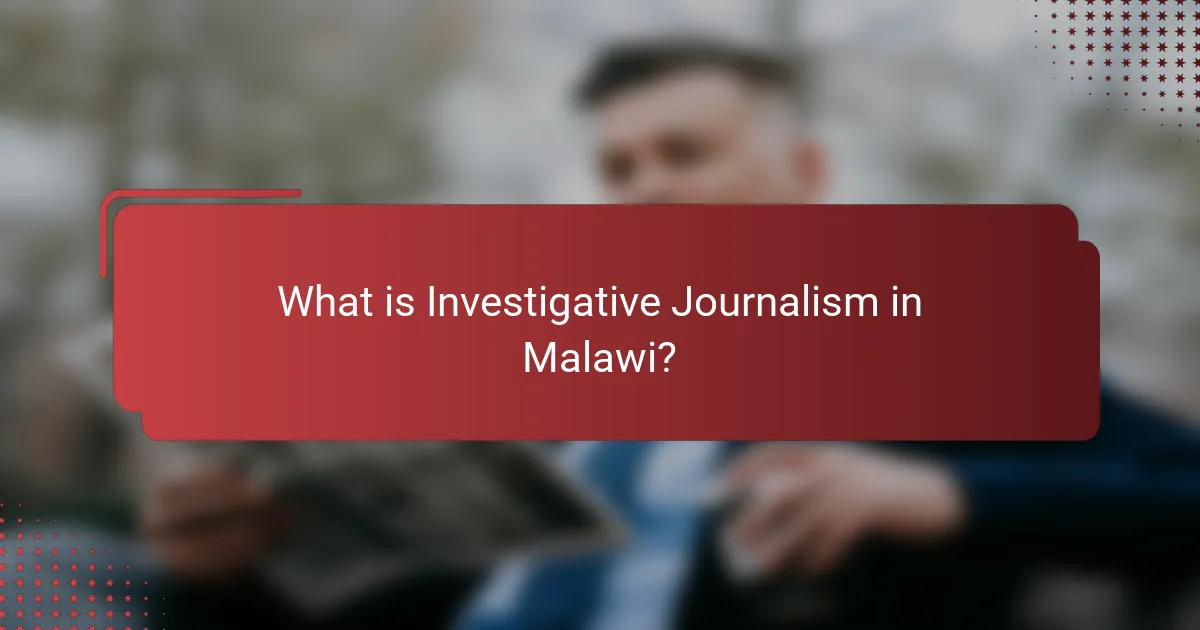
What is Investigative Journalism in Malawi?
Investigative journalism in Malawi is a form of journalism that seeks to uncover hidden truths and expose wrongdoing. It often involves in-depth research, interviews, and analysis of documents. This type of journalism plays a crucial role in promoting transparency and accountability in society. Malawi has seen notable cases where investigative journalism has led to significant political and social change. For instance, investigations into corruption have resulted in legal actions against public officials. The work of journalists in this field contributes to a more informed public and strengthens democratic processes.
How has investigative journalism evolved in Malawi?
Investigative journalism in Malawi has evolved significantly since the early 1990s. The end of one-party rule in 1994 marked a turning point for media freedom. This shift allowed journalists to pursue stories without government censorship. Investigative reporting has since focused on corruption, human rights abuses, and governance issues. Notable cases include the exposé of the Cashgate scandal in 2013. This scandal revealed massive corruption within the government. Journalists faced increased risks, including harassment and intimidation. However, the growth of civil society organizations has supported journalists in their work. Today, investigative journalism continues to play a crucial role in promoting accountability in Malawi.
What historical events influenced the development of investigative journalism in Malawi?
The development of investigative journalism in Malawi was influenced by several key historical events. The end of colonial rule in 1964 marked a significant shift in media dynamics. Following independence, Malawi experienced a period of authoritarian rule under President Hastings Banda. During this time, censorship and state control over the press stifled investigative reporting.
The introduction of multiparty democracy in 1993 led to greater media freedom. This transition allowed journalists to pursue investigative stories without fear of government retribution. The establishment of independent media outlets further contributed to the growth of investigative journalism.
Additionally, significant events such as the 2001 political unrest and subsequent corruption scandals heightened public demand for accountability. These events prompted journalists to delve deeper into government actions and expose malpractices. The emergence of civil society organizations advocating for press freedom also played a crucial role in supporting investigative journalism in Malawi.
What are the key milestones in Malawi’s investigative journalism landscape?
Key milestones in Malawi’s investigative journalism landscape include the establishment of independent media in the early 1990s. This period marked a significant shift from state-controlled media to a more open press environment. In 2003, the formation of the Media Institute of Southern Africa (MISA) Malawi chapter further strengthened journalistic standards and advocacy. The 2014 exposé on the Cashgate scandal highlighted the role of investigative journalism in exposing corruption. Following this, the 2016 introduction of the Access to Information Bill improved transparency and access to public records. In 2019, the assassination of journalist Eric Chikwembi underscored the risks faced by investigative reporters. These milestones collectively illustrate the evolution and challenges of investigative journalism in Malawi.
What are the core principles of investigative journalism in Malawi?
The core principles of investigative journalism in Malawi include accuracy, accountability, and independence. Accuracy ensures that all facts are verified before publication. Journalists must thoroughly research and cross-check information. Accountability requires journalists to be transparent about their sources and methods. This builds trust with the audience. Independence emphasizes the need for journalists to operate free from external pressures. This principle safeguards the integrity of the reporting process. In Malawi, these principles are vital for exposing corruption and promoting social justice. They help uphold democratic values and inform the public.
How do ethical standards shape investigative journalism practices in Malawi?
Ethical standards significantly shape investigative journalism practices in Malawi by establishing guidelines for accuracy, fairness, and accountability. These standards ensure that journalists prioritize truthfulness in their reporting. In Malawi, adherence to ethical standards helps protect sources and promotes transparency. Journalists are encouraged to verify information before publication to avoid misinformation. Ethical practices also foster public trust in the media. For instance, the Malawi Journalists Association has a code of ethics that members are expected to follow. This code emphasizes the importance of integrity and respect for individuals’ rights. Ultimately, ethical standards serve as a foundation for responsible journalism in Malawi, influencing how stories are reported and investigated.
What role does transparency play in investigative journalism in Malawi?
Transparency is crucial in investigative journalism in Malawi as it fosters trust between journalists and the public. It enables journalists to provide clear, factual reporting, which is essential for accountability. In a country where corruption is prevalent, transparency helps expose wrongdoing by providing verifiable information. This practice encourages government and corporate accountability, leading to informed citizenry. According to a report by the Media Institute of Southern Africa, transparency in reporting leads to increased public engagement with media. This engagement is vital for democracy and social justice in Malawi.
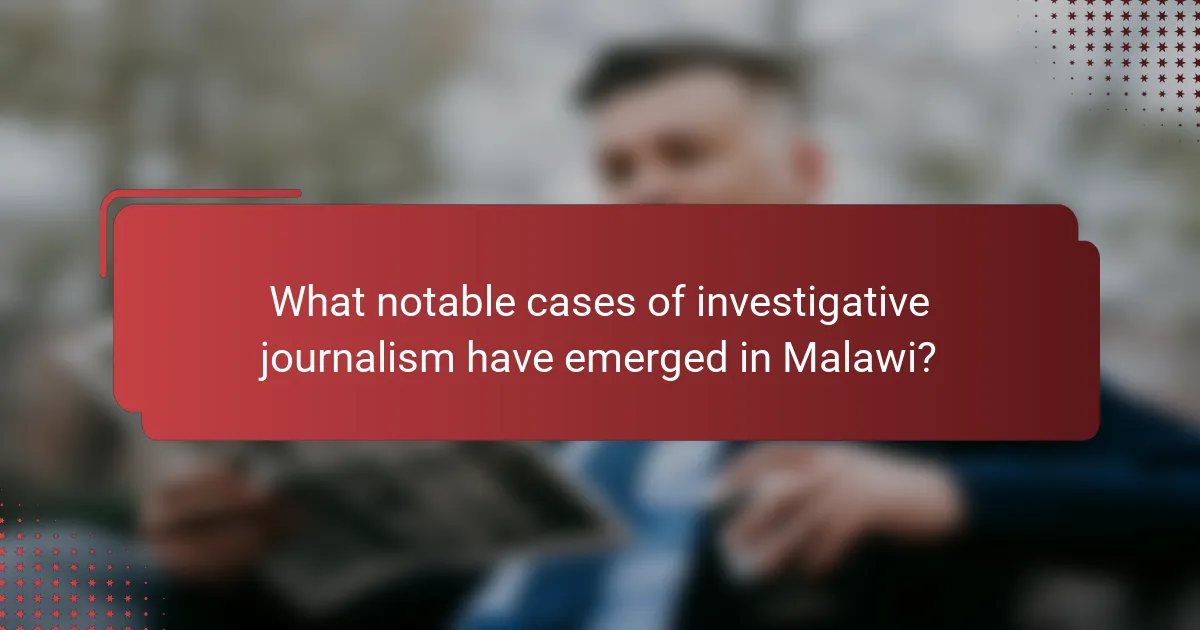
What notable cases of investigative journalism have emerged in Malawi?
Notable cases of investigative journalism in Malawi include the 2011 cashgate scandal. This scandal involved the embezzlement of public funds by government officials. Journalists uncovered evidence of money laundering and fraudulent payments. Their reports led to public outcry and government investigations. Another significant case is the 2018 expose on the misuse of funds in the Ministry of Health. Investigative journalists highlighted irregularities in procurement processes. These revelations prompted accountability measures and reforms. Investigative journalism in Malawi has played a crucial role in promoting transparency.
Which cases have had significant impacts on Malawian society?
Notable cases that have significantly impacted Malawian society include the Cashgate scandal and the 2011 protests against the government. The Cashgate scandal involved the embezzlement of public funds, estimated at $30 million. This case led to widespread public outrage and demands for accountability. The scandal prompted reforms in financial management and increased scrutiny of government spending. The 2011 protests were sparked by rising fuel prices and economic hardships. These protests resulted in a national dialogue on governance and accountability. Both cases highlighted the role of investigative journalism in exposing corruption and advocating for social change in Malawi.
What were the outcomes of high-profile investigative journalism cases in Malawi?
High-profile investigative journalism cases in Malawi have led to significant political and social outcomes. Notable cases have resulted in the exposure of corruption within government and public institutions. For example, the “Cashgate” scandal revealed massive corruption in public funds, prompting government accountability measures. Investigative reports have led to the resignation of high-ranking officials. Public awareness of governance issues has increased due to these investigations. Additionally, some cases have resulted in legal reforms aimed at enhancing transparency. Investigative journalism has strengthened civil society’s role in demanding accountability. Overall, these outcomes have contributed to a more informed citizenry and greater scrutiny of government actions.
How did these cases influence public opinion and policy changes?
Investigative journalism cases in Malawi significantly shaped public opinion and led to policy changes. High-profile cases exposed corruption and mismanagement, increasing public awareness and outrage. For instance, the 2013 cashgate scandal revealed extensive government fraud, prompting protests and calls for accountability. This public pressure resulted in the resignation of key officials and reforms in financial oversight. Additionally, the media’s role in highlighting social issues fostered a more informed electorate. Consequently, policymakers faced demands for transparency and better governance, leading to legislative changes aimed at enhancing accountability. These cases exemplified the power of journalism in influencing societal attitudes and driving political reform.
What challenges do investigative journalists face in Malawi?
Investigative journalists in Malawi face significant challenges including government censorship and intimidation. The Malawian government has been known to restrict press freedom through laws that limit journalists’ ability to report freely. Journalists often experience harassment and threats, particularly when covering sensitive topics such as corruption or human rights abuses. Additionally, limited financial resources hinder the ability of journalists to conduct thorough investigations. The lack of legal protection for journalists further exacerbates these issues, making it difficult for them to work without fear of repercussions. These challenges create a hostile environment for investigative journalism, impacting the quality and quantity of reporting in the country.
How does government censorship affect investigative journalism in Malawi?
Government censorship significantly hinders investigative journalism in Malawi. It restricts access to vital information needed for thorough reporting. Journalists face intimidation and harassment when covering sensitive topics. This creates a climate of fear, leading to self-censorship among reporters. As a result, critical issues often remain unreported or underreported. According to a 2022 report by the Media Institute of Southern Africa, government actions have led to increased challenges for journalists. This environment stifles accountability and transparency in governance. Consequently, the public remains uninformed about corruption and human rights abuses.
What risks do journalists encounter when reporting on sensitive issues?
Journalists face various risks when reporting on sensitive issues. These risks include physical harm, legal repercussions, and psychological stress. In many cases, journalists may encounter threats from individuals or groups opposed to their reporting. For instance, in Malawi, journalists have faced intimidation and violence for exposing corruption. Legal risks can stem from defamation laws or government censorship, which can lead to arrests or fines. Additionally, covering sensitive topics may result in psychological trauma due to exposure to distressing situations. Research indicates that journalists in conflict zones experience higher rates of anxiety and PTSD. Overall, these risks significantly impact journalists’ ability to report freely and safely.

How does investigative journalism contribute to society in Malawi?
Investigative journalism contributes to society in Malawi by promoting transparency and accountability. It uncovers corruption and abuse of power within government and institutions. This type of journalism informs the public about critical issues affecting their lives. It also empowers citizens to demand change and hold leaders accountable. For instance, investigations have led to the exposure of embezzlement cases in government offices. Such revelations often result in legal actions against offenders. Furthermore, investigative journalism fosters a culture of openness in society. It encourages a more informed electorate, which is essential for democracy.
What role does investigative journalism play in promoting accountability?
Investigative journalism plays a crucial role in promoting accountability by uncovering corruption and wrongdoing. It serves as a watchdog that monitors the actions of public officials and institutions. Through in-depth research and reporting, investigative journalists bring to light issues that might otherwise remain hidden. This transparency encourages responsible behavior among those in power. For instance, notable cases in Malawi have led to legal actions against corrupt officials. By informing the public, investigative journalism empowers citizens to demand accountability. The exposure of malpractice can result in policy changes and reforms. Thus, it fosters a culture of integrity and responsibility within society.
How does investigative journalism help combat corruption in Malawi?
Investigative journalism helps combat corruption in Malawi by exposing wrongdoing and holding officials accountable. Journalists conduct thorough research and gather evidence on corrupt practices. This process often leads to public awareness and outrage. Increased scrutiny can prompt government action or policy changes. For instance, investigations into misappropriation of funds have resulted in legal consequences for involved parties. The work of organizations like the Malawi Investigative Journalism Centre has been pivotal in these efforts. Their reports have uncovered significant corruption cases, leading to greater transparency. Therefore, investigative journalism serves as a critical tool in the fight against corruption in Malawi.
What are the societal benefits of increased transparency through investigative journalism?
Increased transparency through investigative journalism enhances accountability and promotes informed citizenship. It exposes corruption, leading to more ethical governance. Investigative reports often result in policy changes and reforms. For instance, in Malawi, investigations into misappropriated funds prompted government audits and financial reforms. Transparency fosters public trust in institutions. It empowers citizens to engage in democratic processes effectively. Investigative journalism also highlights social injustices, driving community awareness and activism. Overall, it serves as a vital check on power, contributing to a healthier society.
What are the future prospects for investigative journalism in Malawi?
The future prospects for investigative journalism in Malawi are cautiously optimistic. Increasing digital access is enabling journalists to reach wider audiences. The growing demand for transparency and accountability is fostering public support for investigative efforts. However, challenges remain, including government pressure and limited resources. Recent cases have highlighted the potential impact of investigative reporting on social issues. Training programs are emerging to enhance journalists’ skills in investigative techniques. Collaborative efforts among media organizations are also on the rise. Overall, while obstacles exist, the commitment to uncovering the truth is strong.
How can technology enhance investigative journalism practices in Malawi?
Technology can enhance investigative journalism practices in Malawi by improving data collection and analysis. Digital tools allow journalists to gather information more efficiently. For example, social media platforms can be used to crowdsource information from the public. Mobile applications enable reporters to communicate securely and share sensitive data.
Additionally, data visualization tools help in presenting complex information clearly. This aids in making findings more accessible to the audience. Online databases and archives provide valuable resources for background research.
Furthermore, technology facilitates collaboration among journalists across regions. This can lead to more comprehensive investigations. Increased access to information technology can also empower citizen journalism. These advancements contribute to greater transparency and accountability in society.
What strategies can be adopted to support and protect investigative journalists in Malawi?
Strategies to support and protect investigative journalists in Malawi include legal reforms, enhanced security measures, and training programs. Legal reforms should focus on strengthening press freedom and protecting journalists from harassment. Enhanced security measures can provide physical protection and digital security tools to safeguard journalists from threats. Training programs can educate journalists on best practices for investigative reporting and self-defense against intimidation. Collaboration with international organizations can also offer additional resources and support. These strategies can create a safer environment for journalists to operate effectively.
What best practices can aspiring investigative journalists in Malawi follow?
Aspiring investigative journalists in Malawi should prioritize thorough research and fact-checking. They must verify information from multiple sources to ensure accuracy. Building a strong network of reliable contacts is essential for gathering credible information. Journalists should also adhere to ethical standards, maintaining transparency and integrity in their work. Understanding the legal framework surrounding journalism in Malawi is crucial to avoid legal repercussions. Engaging with local communities helps in understanding their issues and concerns. Continuous training and skill development enhance investigative techniques and storytelling abilities. Utilizing digital tools and platforms can aid in reaching a wider audience and disseminating findings effectively.
Investigative journalism in Malawi is a critical practice aimed at uncovering hidden truths and promoting accountability within society. This article examines the evolution of investigative journalism in Malawi, highlighting significant historical events, notable cases such as the Cashgate scandal, and the challenges faced by journalists, including government censorship and intimidation. It also outlines the core principles and ethical standards that guide investigative reporting, the societal benefits of transparency, and the future prospects for this vital field. Through these discussions, the article emphasizes the role of investigative journalism in fostering informed citizenship and driving social change in Malawi.
